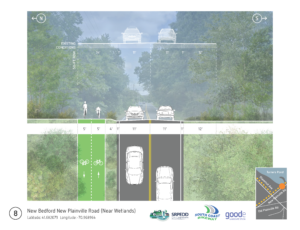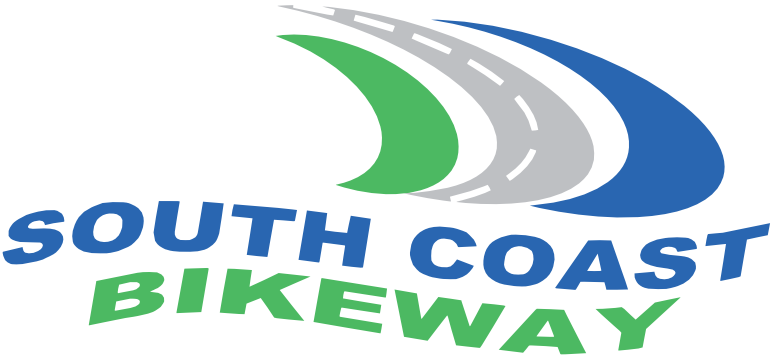New Bedford
Few cities compare to the rich and diverse history of New Bedford. Vibrant neighborhoods, arts, culture, tourism, and, of course, the fishing fleet and growing offshore wind industry all contribute to this international city’s exciting street life and culture.
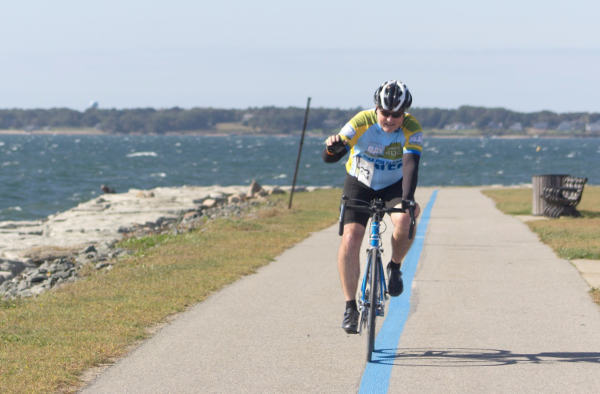
New Bedford is active in regional bikeway planning and local bicycle/pedestrian planning. The city focuses on outreach, infrastructure, and last-mile connectivity. Bike/ped issues are a part of the city’s adopted Complete Streets policy and Safe Routes to School projects.
NB Resilient is a citywide planning committee that consists of city departments and community partners. The Department of City Planning chairs the group and meets bi-monthly to discuss progress on projects, plans, and the planning of community events.
In 2019, New Bedford launched #BikeNB and expanded ‘Blue Lane’ Planning, with the intent of connecting the City with a network of bike and pedestrian paths to offer transportation alternatives within the City.
The Blue Lane
The Blue Lane is a cohesive designation for the city’s waterfront path from the CoveWalk and HarborWalk along the South End peninsula to the planned RiverWalk on the banks of the Acushnet River in the North End. Spanning the shoreline of the city as a signal to residents and tourists of a contiguous set of recreational pathways that allows travel along the entire New Bedford waterfront, connecting the attractions not only to local neighborhoods, but also to one another. The improvements along the waterfront allow visitors to New Bedford’s spectacular water views as never before. Once the path is contiguous, it will create a visitation experience that could easily span several days, boosting the City image as a destination.
Download the full Blue Lane presentation (6.5mb PDF)
HARBORWALK
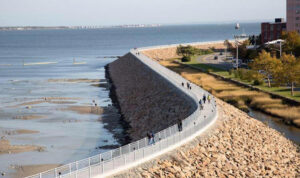
Opened in 2015, the HarborWalk is 3,880 feet long and tops New Bedford’s hurricane barrier on the east side of the city’s southern peninsula connects with a bike path that runs along the waterfront to the tip of the peninsula and into historic, 50-acre waterfront Fort Taber Park. The HarborWalk gives visitors a chance to look out upon where Buzzards Bay (East Beach) meets historic Fort Taber, beyond to Fairhaven’s Fort Phoenix, West Island, and noted points of interest like Butler Flats Lighthouse. The pathway is lit at night, making any time a good time to take in the natural wonder of South Coast, MA. The HarborWalk is also pet friendly.
COVEWALK
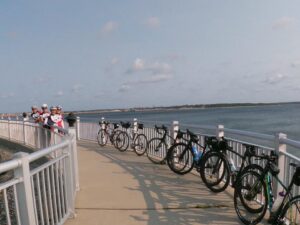
Opened in early 2017, the 5,550-foot CoveWalk sits atop the hurricane barrier on the western side of the peninsula, overlooking Clark’s Cove. The pathway is lit at night, making any time a good time to take in the natural wonder of the South Coast. The CoveWalk is also pet friendly.
WORKING WATERFRONT CONNECTOR
In feasibility study, this is a planned 1.7 mile bike/ped connection along Herman Melville Blvd and North Front Street through the working waterfront to allow for recreational opportunity and safe access for workers and visitors traveling by foot or bike. This neglected industrial roadway, potholed and forgotten, is poised to become an economic driver for the district, which has been recently rezoned for Mixed Use development and is proximate to a planned MBTA station, realizing the potential for its Right of Way as a multimodal thoroughfare. Potential upgrades include a spine of green infrastructure to address potential storm surge, upgraded rail crossings, bus and interpretive stops, an off road shared use path, and design guidelines for building setbacks and facades.
RIVERWALK
Currently in planning and construction
The RiverWalk will be a 17,000-foot recreational waterfront path on the upper harbor, along the western bank of the Acushnet River north of the New Bedford-Fairhaven Bridge. The plan for construction is in several segments and will mobilize over several years, dependent on the environmental remediation of brownfield sites along the coast. The RiverWalk project is the Northern extension of the Blue Lane, however, it is equal parts a recreational path project and habitat restoration, contrasting with the urban downtown it will be a naturalized area with passive activities such as birdwatching and fishing. The New Bedford River Walk Feasibility Study Update was presented in June 2020.
Dartmouth, along with Westport and New Bedford, has engaged SRPEDD to conduct the Closing the Gap Feasibility Study. This study will identify existing conditions and will identify routing options to connect Fall River to New Bedford through Westport and Dartmouth.
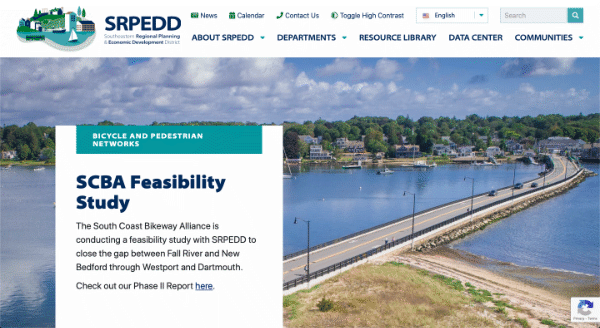
Below is a conceptual drawing of a shared-use path along New Plainville RD prepared by Goode Landscape Design with funds received from BayCoast Bank.
